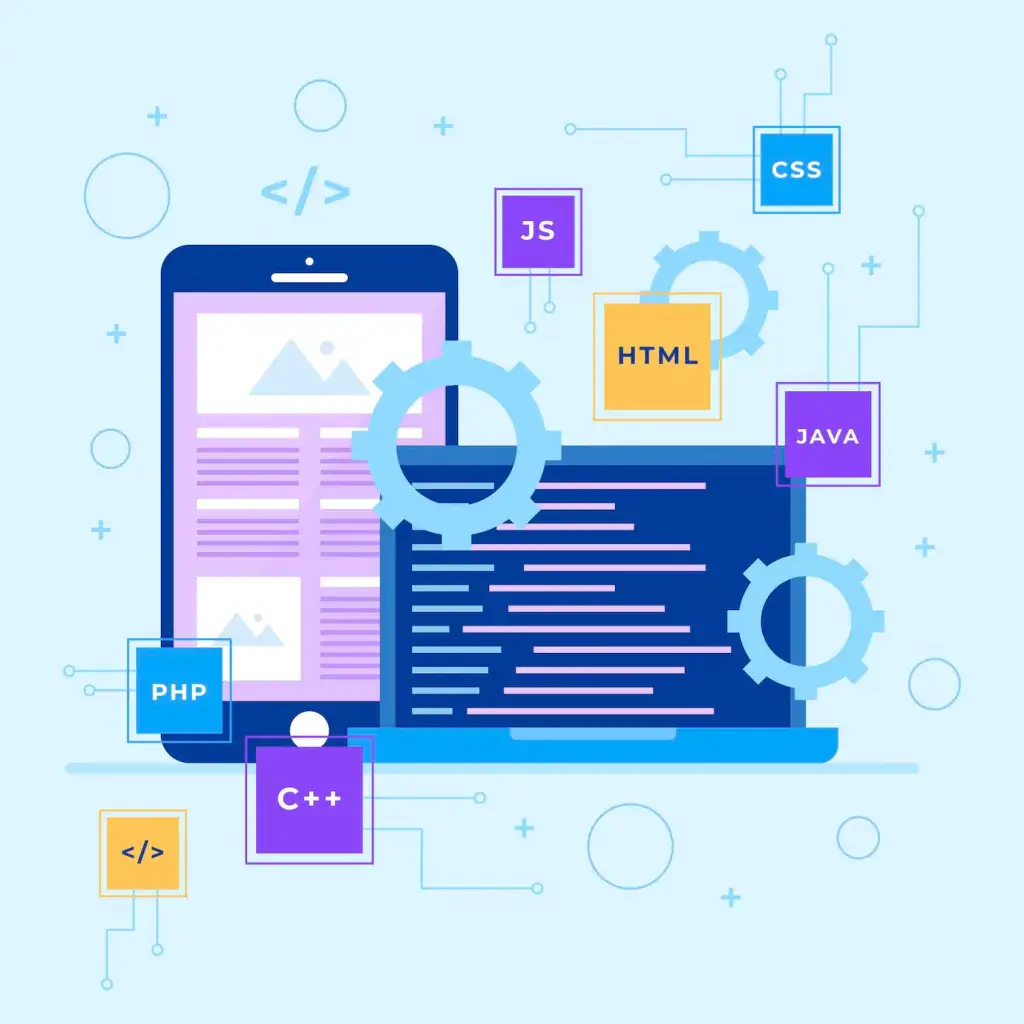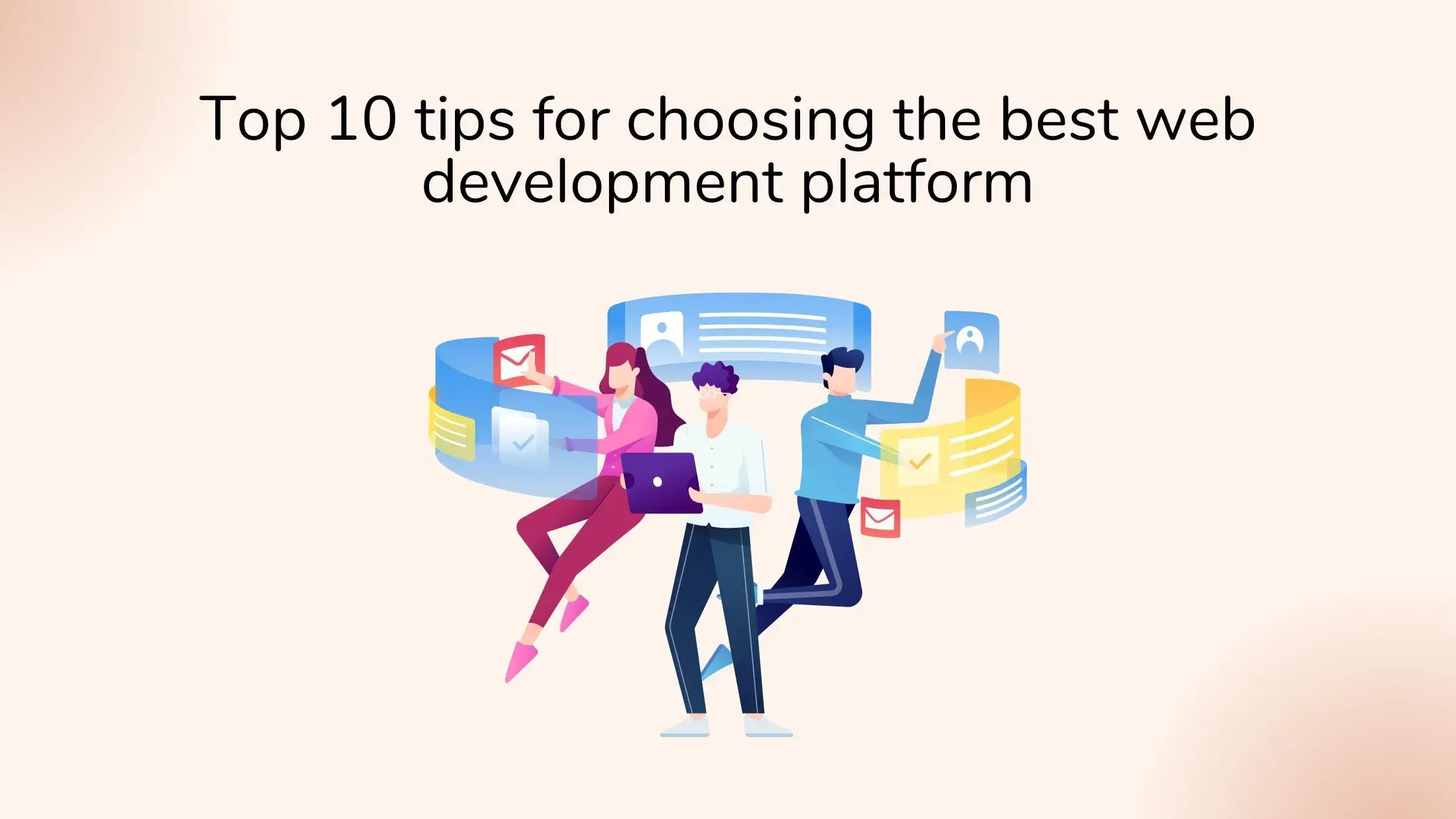Introduction
Choosing the right web development platform is crucial to your website’s success. Though there are many different platforms to choose from, it can be difficult to decide which one is right for you. This article discusses the top 10 tips for choosing a web development platform. By following these tips, you can make sure that you select the platform that is best suited for your needs.

What is Web Application Development?
Web application development is a wide-ranging task involving designing and developing websites for hosting on intranets or the internet. The process includes web designing, content creation (including client-side scripting), and network security configuration, among other things.
There are three main parts to developing a website: building, maintaining, and managing. These tasks include everything from updates to ensure its performance or user experience goes smoothly for visitors on the site and any other actions required by you to make sure all aspects of this process go off without error.
Web design is the art and science of creating websites. It’s done by web developers or website designers who work to ensure that your site looks great and functions properly.
How to Choose the best Web Development Platform?
With so many options to choose from, it’s a tough task to pick the right web platform for your business. Every website has its own set of unique and powerful features and functions that work best with what you need.
To ease the confusion, we have explained a few important checkpoints to consider before choosing the right web platform:
● Zero-Down on The Type of Website You Require:
The web development process must begin with an understanding of what you wish to convey to your audience. This can include a blog, an e-commerce site, or a company website for showcasing products and services.
When coding websites, the story behind your motivation dictates what language to choose, what framework will fulfill a particular requirement, and how the website will be hosted. Scalability is an important aspect in helping your business grow as your site grows.
● Must be Easy to Access:
The type of website you plan to launch will determine your chosen platform. If you need to display a few articles online, you should find something simple and inexpensive.
Suppose your requirement is complex, like if your customer base is looking for ways to improve their experience with you.
For example, they want automation, documentation, and data requests for easier access on your website so that customers can plan their appointments or change them at any time without having to speak up directly through phone calls – this way, it’s more convenient than ever.
● Performance & Speed of The Website:
Many people these days will leave a site if it takes too long to load. This is because they want the information on your website as soon as possible and not have anything else holding them back from going elsewhere, where maybe there are better or more reliable services available for searching what you offer.
You can’t afford any downtime either; 2 seconds could mean lost prospects over time. You can’t let this happen by ensuring all required updates (such as updating images) happen regularly so no unexpected problems arise, which might cause visitors frustration when visiting your page.
● Better User Experience:
Your brand value and your business directly depend on the user experience. It is imperative to balance the complexity of a platform’s code with its user experience. Unfortunately, developers are often consumed with programming and turn a blind eye to UI and UX.
A developer should pay attention not only to programming but also to designing for better usability so they can provide outstanding results that will lead to their company’s growth by keeping users engaged longer than before.
Here is an overview of the 10 most popular website building platforms:
1. WordPress:
WordPress is a free and easy-to-use blogging platform that you can host on your server. Millions of people worldwide use this software to create their personal blogs, company websites, or business sites daily.
WordPress is a popular and freely configurable content management system that can be used to set up commercial websites. In addition, it has additional features such as a WYSIWYG text editor and co-authoring with multiple authors that make the process easier than ever before.
2. Macaw:
Macaw is a great choice for those looking to create their website. With its flexible design tools and ability to easily style elements, it will have you up and running with beautiful typography in no time at all.
Save your design elements in a library that you can reuse later. You can make edits on the fly using Alchemy’s interactive engine, which converts content to CSS or HTML codes. Because of this feature, you won’t have any problems with mobile devices – everything will be optimized across all formats.
3. Mockplus:
Mockplus is a powerful yet simple design tool for designers and developers. With one goal in mind – to offer users an easier way of creating website prototypes without having too many distractions from their workflow or skillset. The software has come up with features like fastly built mobile apps that can be reviewed quickly on desktop browsers.
4. Weebly:
Weebly is a great website development software if you’re looking for an easy way to make your own personal or business site. You can choose from pre-built templates with professional designs, but it also allows users who have coding experience to edit HTML/CSS code to know exactly how their page looks when finished.
You can spark your web design and development creativity with more than 40 layout designs, including website maps and portfolios. The application offers both trendy and responsive templates.
5. Shopify:
Shopify is an amazing platform for those who want to build their eCommerce website and host it themselves to make their online presence. The intuitive interface makes managing updates easy and back-ups if anything goes wrong with the site or its hosting service.
With Shopify’s Payments, you can easily integrate third-party payment gateways and manage inventory while enjoying powerful stats like hundreds of designs from which to choose.
6. Bootstrap:
Bootstrap is an open-source, responsive design framework that makes it easy to create websites. It contains templates for typography and button components, among other things – making your life easier.
Bootstrap is a framework for creating beautiful designs for websites using HTML, CSS, and JavaScript. In addition, it has all of the most advanced development features to please technical users worldwide.
7. Adobe Dreamweaver:
Dreamweaver is a complex product that can be used for everything from simple page design to developing dynamic pages written in ColdFusion, PHP, or ASP with CSS and XML. It also has features such as JavaScript development through XSLT/XHMTL, which will make your website more interactive than ever before.
If you are looking to develop complex, interactive websites, Dreamweaver is your best option. Its support for many scripting languages like PHP and ASP gives designers full control of how their site will function on the internet without any limitations or restrictions in place.
8. Codepen:
CodePen is a web development platform that allows you to build, test, and discover front-end code. It’s friendly for designers who want access to design patterns and seasoned developers looking at new ways to improve their workflow or learn from others’ innovations without leaving their comfort zone.
9. Github:
GitHub is a platform for developers from all over the world to connect and make contributions. The world’s largest software developer community, GitHub has more than 83 million users and is known for its suggestion service that connects developers from all over the globe.
They can utilize code review, project management, and bug tracking to find the solutions best suited to their needs with access to open sources right on the site.
10. Laravel:
Laravel is the go-to solution for those looking to build complex, high-producing websites. It’s easy on your time and provides a quality product without breaking your wallet.
Laravel is a great choice for those who want to develop websites quickly with little effort. However, it may not be ideal when you’re working on larger or more complex projects because of its lack of scalability and functionality compared to other frameworks available today, such as CMSs that provide better capabilities during these circumstances.
Conclusion:
In conclusion, there are many factors to consider when choosing a web development platform. By evaluating your needs and the options available, you can decide what will be best for your business. We hope our top 10 tips have helped you in this process. Hiring a top-notch Web Developer is the best way to ensure your business has what it needs.

A fun-loving, creative, and passionate writer. Experienced as a curriculum writer for kids at CompuSkool (Information Technology) written interactive learning materials that engaged young minds between 3 to 17 year olds across different technology areas. After a break from writing, now pursuing passion through blogging. Now a technical writer at Squash Apps. Waiting for the future to reveal itself as days unfold.


